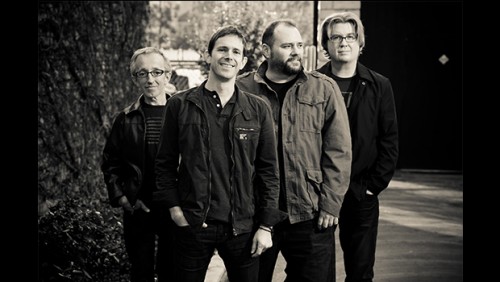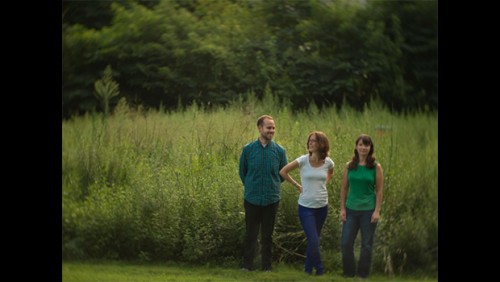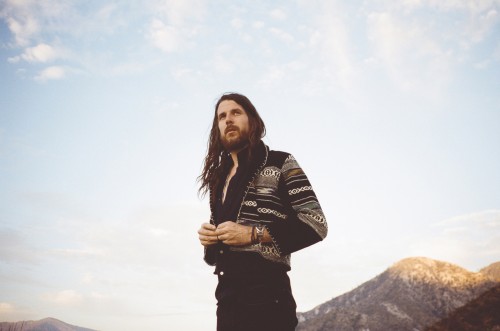By Michael Lello
When Toad The Wet Sprocket released its last studio album, Bill Clinton was president. Babies born that year are now old enough to drive. “The English Patient” won Best Picture at the Academy Awards.
In other words, it was a long time ago — 1997, to be exact — that Toad, the catchy hitmakers behind “Walk on the Ocean,” “All I Want, “Something’s Always Wrong” and “Fall Down” — put out “Coil” and called it a day.
Now, after a few years of playing shows together again, the band — vocalist and guitarist Glen Phillips, guitarist Todd Nichols, bassist Dean Dinning and drummer Randy Guss — finally returned to the studio to record “New Constellation,” which the band put out on its own Abe’s Records on Oct. 15.
So why the decade-and-a-half break?
“Uhh, ’cause we weren’ feeling it? That’s pretty much the size of it. We were all busy doing other things, and I guess we had a lot of history to go and we had a lot of growing up to do,” Phillips told Highway 81 Revisited recently. “And obviously people have asked if we were going to do another project over and over, and up until it seemed like the right thing, the answer was no, and when it did seem like the right thing, the answer was yes. That’s about the size of it.”
Phillips spoke to us about the new record, what it’s like to pursue an independent career after major label success, what he appreciates about Toad’s reunion and the band’s tour, which hits The Bowery Ballroom Nov. 6, the 9:30 Club in Washington, D.C. Nov. 7, the Bergen Performing Arts Center in Englewood, N.J., on Nov. 8 and the Keswick Theatre near Philadelphia on Saturday, Nov. 9.
H81R: Why is the time right to reconvene and do an album?
GP: There were a few changes over time. I think it was very easy for us to go in our own four corners and get stuck in the past. At one point about four years ago, I fell through a glass table and slashed the ulnar nerve on my left arm, so I had some pretty serious, still have some pretty serious nerve damage in my left hand. All of a sudden the band had come together as a unit, and I had to get a little more humble and accept some help, and the other guys had to show up and make room for me to learn how to play guitar again, because my hand didn’t really work the same way. For me, that was a big part of the change. That event broke us out of some of our hold habits and got us to start appreciating each other a little more and appreciate the position we were in.”
H81R: What was the writing process for “New Constellation”?
GP: The writing process is all over the map. It’s everything from stuff I’ve written myself to cowrites with friends outside of Toad to Todd and Dean, who’d since Toad — they’d become a writing partnership, gone to Nashville and done a lot of writing trips up there – they brought their partnership into it and interfacing with me for lyrics. So it was a very varied process.
My favorite part was getting to write for Toad again. I had been in a habit of writing stuff that I could easily play solo acoustic, and so all of a sudden I got to write songs with three-part harmonies and drums; I get to write for a rock band again.
H81R: When did Toad start playing shows again?
GP: We started doing shows in 2006. Show up, play a few shows. We’d usually go, ‘Oh, that’s why we’re not a band anymore.’ We would do shows and wait a year and do a few more and see if that felt any better. Ya know, varying degrees, and I’m certainly not blameless in this, things would feel uncomfortable. Three years ago, four years ago, it started feeling that our new normal was getting along, our new normal was being more generous with each other, and that really opened the door again.
H81R: You used Kickstarter to fund the new album. How was that experience, and how does it compare to they ’90s, when you were on a major label?
GP: It’s worked out great to begin with. We were looking at our options. The label world isn’t what it used to be (laughs). It’s a lot more conservative, and we’re not hot 20-year-olds anymore. So looking at what we could get, if we were to do kind of a regular recording deal these days, we would have had not that huge dollar commitment, and we would probably have to give up ownership of the record and all of the other stuff you kind of give up when you start with a label. And as it is, we were able to walk in, do the record we wanted to make without a lot of outside involvement – without any outside involvement – get it directly to fans, have the record paid for and have enough money to actually pay for promotion, distribution, the art, all this creative side of things. And we still have some left to promote the record. And we own it. And we don’t owe anybody. It’s an incredible thing. If you take out enough layers of the business, all of the sudden a small group of people can be a really powerful force. Which isn’t to say if at some point in this project there was a partnership to have in licensing it to a label and going that route, we’re totally open to that. But this way, it’s just we’re getting to start it as a smart family business instead of starting it as a massive gamble (laughs). There’s a terror to releasing albums when you’re in debt and you don’t even own the thing (laughs). If we find partners in the business now, we’ll be able to look ’em eye to eye instead of having to go in with our hand outstretch.
H81R: Was it easier in the ’90s?
GP: It’s a different world. I don’t know if I could compare it. The music industry used to be based on selling records. To a household that really liked you, you’d sell at least a cassette tape. . . . These days, for every 20 households that listen to your record, you’re lucky if one of them actually buys it. So that whole part of the business is really different.
Then again, we have the Internet, we have all these different ways of reaching people we didn’t have before, although that idea of reaching people, everybody also has the same tool set, so there’s a whole lot of noise out there, a whole lot of competition. So it isn’t any easier to get heard, and it’s still an expensive proposition. It still takes people that are working hard, and it’s a landscape that changes a lot more quickly.
So the best thing that ever happened to our career was that we were signed at a time when labels could invest in career development, and Columbia was great to us. They took their time and let us grow. I wouldn’t take that back for anything. And that’s enabled us in this current environment to start where we are more independently and not have to get a record deal right away. And ya know, if we end this and we do really modestly, we’ll be OK, and if we do really well, we’ll be OK. It’s nice to have that pressure off, so that we can back to our business, which is playing the shows and making music.
H81R: A lot of bands from your era are getting back together. Do you see a resurgence in interest in that era’s music?
GP: (Laughs). I don’t know if I’m seeing so much of it yet. And we were, I think, even at the time, we were a little bit outliers. We had this really friendly sound, but we had these heavy lyrics, and I think we appealed to a kind of nerdy audience at a time when nerds didn’t have a public voice, and it’s hard to remember when that was; at this point, nerds rule the world, but growing up, Dungeons & Dragons didn’t make you cool (laughs), but I played it anyway. It’s a different era we’re living in now, and the thing is, the people that cared about our music really stuck with us, and it wasn’t about fashion, and we weren’t trying to be so cool in the moment that we did stuff that’s embarrassing now. So most of our songs can be sung by a 40-year-old, and luckily they’re not about being 16 (laughs). So we’ll see. I keep hearing there’s more interest for our era, and people are coming to shows; maybe they’re right.
H81R: What lessons have you brought from your solo career back to Toad?
GP: I mean, I’ve been so far out of the industry, I’m a little cottage operation. I’ve been on the road a lot. How can I say this. Toad worked really hard, but we didn’t have a lot of dues to pay. We got signed when I was 18, we got great support from a great record company sort of at their peak. We were really incredibly lucky. So it wasn’t until the band broke up and I couldn’t get a record deal that I realized how hard you actually have to work and how many jobs there are. Still, I’m at a show in Massachusetts, and I do my website, I book my travel. I’ve mostly been a one-man show. I have a booking agent, I have had managers, I have had labels, but mostly I’ve done the lion’s share of the work.
So going back to Toad, for me, I don’t take it for granted. The fact that we have a guitar tech just blows me away. I haven’t afforded a guitar tech in ages. And the fact that we have this team that’s helping us out, and the fact that all of these people want us to play. I’m so aware of how much it means, how much it helps, and how lucky we are, and for me that really is the thing that I can bring to it is the perspective of having kind of stayed on tour and having gotten very, very small on my own. It allows me to really instead of look at the past with resentment – which I think I wasted a fair amount of time doing – I can look at what we have with a lot of gratitude.
H81R: What’s next for Toad? Are you committed to making another album, or is it open-ended?
GP: It’s open-ended. We’re going to see this album through. We’ve got another year or two, and hopefully we’ll be getting some good festivals and stuff next year. We’ll see. It takes luck. It’s always taken luck, but these days you get on some fall season preview or movie or ad campaign. It used to be you made your video, you did your touring, you worked radio and you crossed your fingers. Now, it’s like everything is an outlier. Maybe we’ll have luck, and maybe we won’t. We’ll work as hard as we can and play a ton of shows, and then at the end of next year, if we feel like the world is done with the record. . . . I’m due for another record, Todd and Dean are due for another Lapdog record, so I’m sure we’ll take some kind of break and work on something else for a minute, and then maybe another record, you never know.
H81R: Do you have any projects lined up for after this Toad album cycle?
GP: There’s stuff I would love to do. I had the WPA project, which was this big rambling 8-piece band with a couple friends from Nickel Creek – by the end of it it was a 4-piece with only two of the original members. I love that group of people. So something larger and more collaborative like that again. Remote Tree Children with my friend John Askew, which is much more in like I guess a Flaming Lips vein, it’s an odd, electronic, total geek project with songs about gold farming – it’s a weird one. And I have tons of friends I want to collaborate with. I look forward to getting back to some of that as well, because there’s just a lot of great people to make music with in the world.
H81R: As a fan, is there a band you’d like to see get back together and do an album?
GP: No. Having been in a band, I realize you have your time. And people like to have a very idealized view of what it is to be in that kind of creative relationship, and I think if people think that they can’t make it happen, they really shouldn’t make it happen. In the years where I didn’t think Toad could or should, I stayed far away. I think you should make art with people you want to make art with, or it’s not going to be very good art. Now that I want to again, I’m happy to be here. So no, nobody I’d really like to see back together, unless I could raise some people from the dead, but that’s a whole other thing (laughs).




Leave a Reply